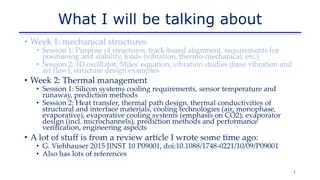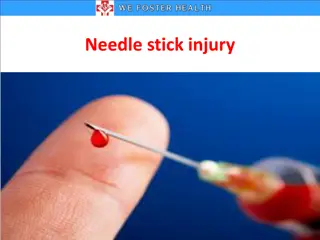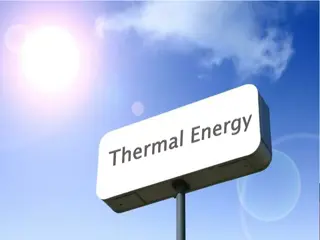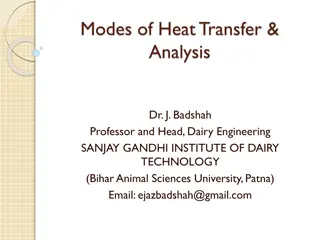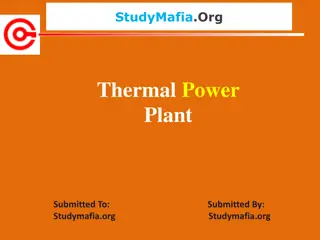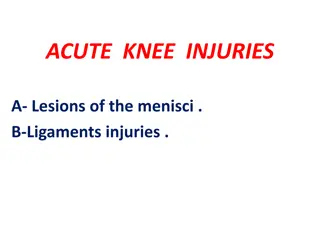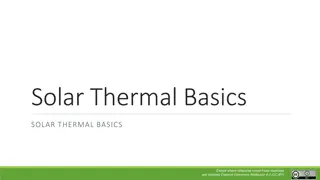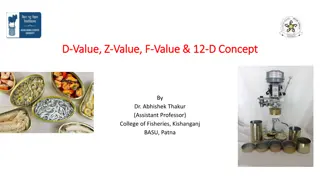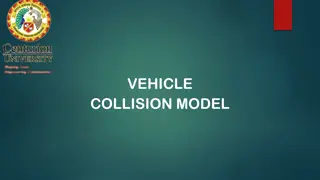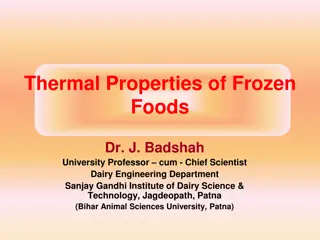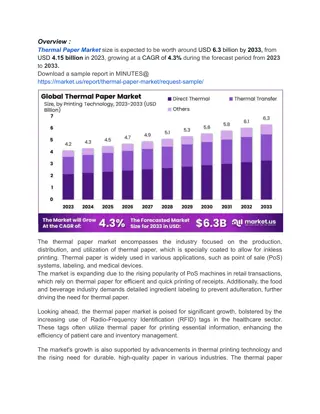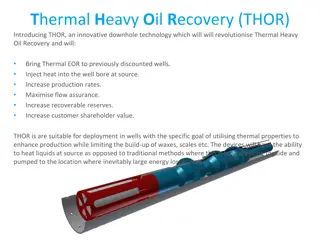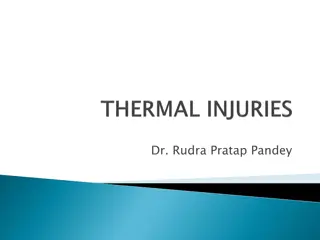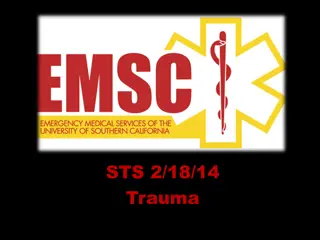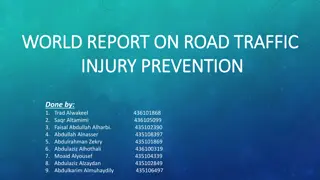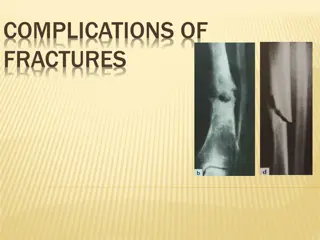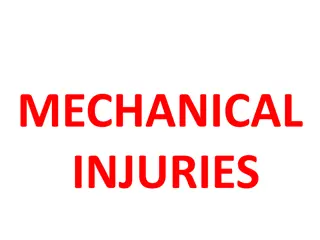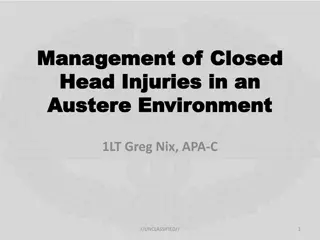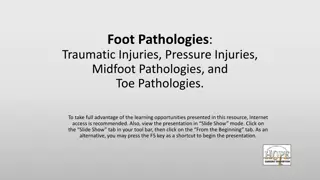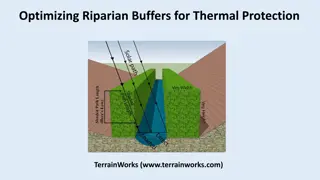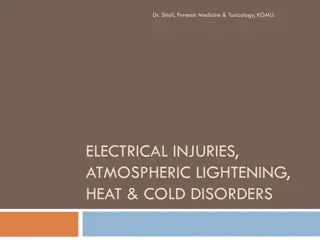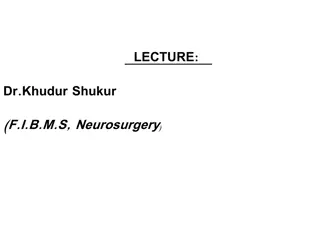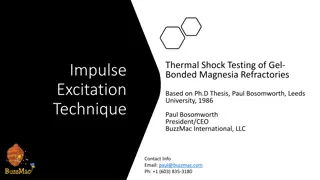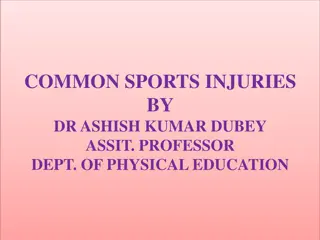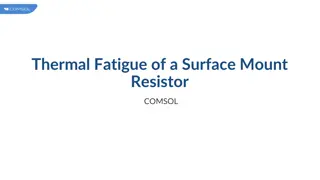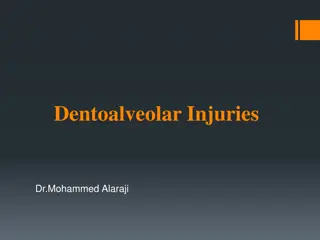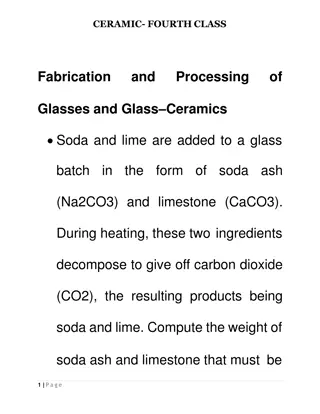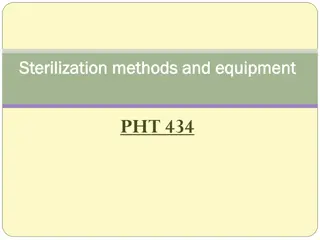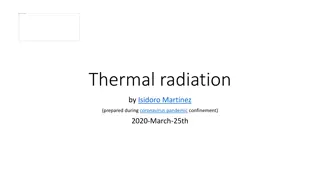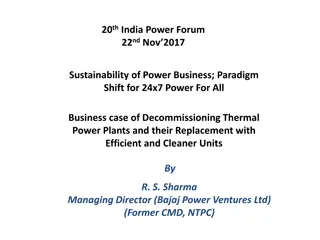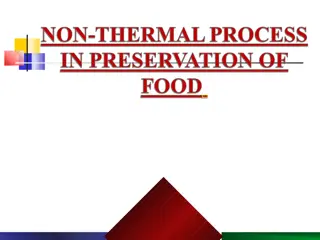Comprehensive Guide on Injury, Poisoning, and External Causes
This detailed guide covers various aspects of injuries, poisonings, and other consequences from external causes. It includes information on ICD10 and ICD9 coding, recording and treatment details, vocabulary related to different types of injuries, body parts classification, and code structures for di
1 views • 39 slides
Needlestick Injuries Prevention and Safety
Prevent needlestick injuries by avoiding unnecessary needle use, using devices with safety features, and implementing safe work practices. Healthcare professionals should report injuries promptly, participate in training, and get vaccinated. Be cautious when handling surgical sharps to prevent injur
5 views • 10 slides
Implementation of Utility Thermal Energy Network (UTEN) and Jobs Act Update
The implementation of the Utility Thermal Energy Network (UTEN) and Jobs Act involves a series of events and discussions, including the signing into law, technical conferences, pilot project proposals, and withdrawals. Various utilities have proposed pilot projects targeting different types of custo
3 views • 15 slides
Thermal Management and Mechanical Structures Overview
This content provides detailed information on mechanical structures and thermal management in engineering systems. Topics include the purpose of structures, alignment, stability requirements, thermal loads, vibration studies, heat transfer, cooling technologies, and the importance of effective therm
1 views • 37 slides
Understanding Needle Stick Injuries and Prevention
Needle stick injuries are percutaneous piercing wounds caused by needles or other sharp instruments. They pose significant risks, including exposure to blood-borne diseases. Health-care workers are particularly vulnerable, with millions experiencing such injuries annually. Proper training, safe prac
0 views • 35 slides
Understanding Thermal Energy: Transfer & Transformation
Explore thermal energy and its transfer mechanisms such as conduction, convection, and radiation. Learn how thermal energy moves between objects of different temperatures, and why heat is always transferred, not coldness. Enhance your knowledge on the fascinating world of thermal energy dynamics.
0 views • 14 slides
Understanding Heat Transfer: Conduction, Thermal Conductivity, and More
Explore the fundamentals of heat transfer through conduction and thermal conductivity as explained by Dr. J. Badshah. Learn about the modes of heat transfer, Fourier's law, thermal resistance, and the relationship between thermal and electrical conductivity. Discover the essential features of therma
0 views • 9 slides
Understanding Thermal Conductors and Insulators in Energy Transfer
Today's lesson focuses on energy transfer, specifically on conductors and insulators. Learn about the characteristics of thermal conductors and insulators, how they affect the flow of thermal energy, and their real-life applications. By the end of this lesson, you will be able to distinguish between
0 views • 13 slides
Understanding Thermal Power Plants: Overview and Operation
Thermal power plants play a crucial role in converting heat energy into electricity for various applications. This article covers the definition, layout, working principle, and components of thermal power plants, highlighting their advantages and top features. From converting heat into mechanical po
0 views • 20 slides
Understanding Acute Knee Injuries: Meniscal Tears and Ligament Injuries
Acute knee injuries, such as meniscal tears and ligament injuries, are commonly caused by trauma or twisting motions. Meniscal tears can lead to pain, swelling, and locking of the knee joint, especially in young active individuals. Understanding the anatomy of the knee joint and meniscus, along with
0 views • 56 slides
Understanding Thermal Properties of Materials
Materials respond differently to heat based on their thermal properties such as heat capacity, thermal expansion, conductivity, and shock resistance. The ability of materials to absorb heat, expand with temperature changes, and conduct heat varies across ceramics, metals, and polymers. Heat capacity
0 views • 19 slides
Understanding Solar Thermal Technology Basics
This content covers the basics of solar thermal technology, including insolation, passive solar design, and active solar systems for producing hot water. It explains the uses of solar thermal energy in domestic, commercial, and pool heating applications. The efficiency of solar thermal panels compar
1 views • 13 slides
Understanding Bacterial Spore Survival and Thermal Death Rates
Survival of bacterial spores during heat processing is crucial for food safety. The concept of Decimal Reduction Time (D value) and Thermal Death Time (TDT) curve help in understanding the thermal destruction of bacteria or spores. The Z value indicates the change in temperature necessary to cause a
6 views • 14 slides
Understanding Vehicle Collisions: Causes, Types, and Injuries
Vehicle collisions involve various types such as front impacts, side impacts, and rear-end collisions, resulting in different injuries like back and head injuries, neck injuries, soft tissue damage, broken bones, and internal injuries. Understanding the causes and effects of collisions can help prev
0 views • 14 slides
Thermal Properties of Frozen Foods: Importance and Modeling Equations
Understanding the thermal properties of frozen foods is crucial for ensuring food safety and quality. Dr. J. Badshah discusses the significance of freezing, reduction of microorganism activity, and the role of thermal properties like density, specific heat, and thermal conductivity. Freezing point d
0 views • 15 slides
Healthcare Sector's Growing Adoption of RFID Tags Boosts Thermal Paper Market
Thermal Paper Market By Printing Technology (Direct Thermal, Thermal Transfer, Others), By Width (2.25\u201d (57mm) and 3.125\u201d (80mm)), By Application (Lottery & Gaming, Point of Sale (PoS), and Tags & Labels), By Region and Companies - Industry
0 views • 4 slides
How to Create Thermal Images from a Thermal Flashlight
Thermal flashlight images can be made using different approaches such as long exposure photography or using light tracking software. This guide provides detailed steps on how to capture thermal images effectively with tips on light tracking apps, long exposure techniques, and imaging locations for o
0 views • 8 slides
Revolutionary Downhole Technology for Thermal Heavy Oil Recovery (THOR)
THOR is an innovative downhole technology that aims to revolutionize Thermal Heavy Oil Recovery by bringing Thermal EOR to previously discounted wells, increasing production rates, maximizing flow assurance, and enhancing recoverable reserves. THOR's key benefits include flexible power options, safe
1 views • 6 slides
Overview of Burn and Scald Injuries and Classification
Burn injuries from dry heat and scald injuries from hot liquids or steam are common forms of thermal injuries. Other etiological classifications include exposure to chemicals, electrical energy, and radiation. The extent of tissue damage is directly related to temperature and duration. Classificatio
1 views • 31 slides
First Aid Tips for Common Trauma Injuries
Learn how to manage various trauma injuries such as skull fractures, eye injuries, blowout fractures, epistaxis, mouth injuries, soft tissue injuries, open injuries, and penetrating wounds with practical first aid techniques. From treating bleeding and impaled objects to saving dislodged teeth and c
0 views • 16 slides
Preventing Road Traffic Injuries: A Global Perspective
Road traffic injuries are a significant global issue, causing millions of deaths and injuries annually. This report highlights the complexity and dangers of road traffic systems, emphasizing the need for increased awareness and preventive measures at governmental, industrial, and individual levels.
1 views • 27 slides
Complications of Fractures: Types and Risks
Complications of fractures can be classified as general, local early, and late complications. General complications include shock, embolisms, and fever while local complications involve injuries to nearby tissues and infections. Early local complications can lead to visceral, vascular, nerve injurie
0 views • 29 slides
Understanding Mechanical Injuries: Types, Classification, and General Principles
Mechanical injuries encompass a variety of harms caused to the body, mind, reputation, or property. These injuries can be classified into medical, legal, and medico-legal categories based on factors like intentionality. The types of mechanical injuries range from blunt force trauma to thermal, chemi
0 views • 79 slides
Management of Closed Head Injuries in an Austere Environment Overview
Understanding the pathophysiology of brain injuries, including intracranial pressure changes and specific injuries such as traumatic brain injury (TBI), skull fractures, brain bleeds, and diffuse axonal injuries. It covers classifications, diagnosis, and treatment approaches for mild/concussion, mod
0 views • 27 slides
Insights into the Editorial Process of Applied Thermal Engineering Journal
Applied Thermal Engineering journal, under the leadership of Editor-in-Chief Prof. David Reay, has a rich history dating back to 1981. The journal's evolution, from its origins as Heat Recovery Systems to its current name and scope, reflects its commitment to advancing thermal engineering knowledge.
0 views • 29 slides
Understanding Foot Pathologies: Traumatic Injuries and Pressure Injuries
Explore common foot pathologies including traumatic injuries like plantar fasciitis, turf toe, and sprains, as well as pressure injuries such as plantar ulcers and heel spurs. Learn about the causes, symptoms, and treatment options for these conditions.
0 views • 33 slides
Optimizing Riparian Buffers for Thermal Protection in Teanaway River Watershed
Explore the study comparing optimized riparian buffer designs with fixed-width buffers in non-fish bearing streams of the Teanaway River watershed, focusing on maximizing thermal energy reductions with considerations for channel orientation and forest density. By utilizing NetMaps and thermal energy
0 views • 24 slides
Understanding Back Injuries and Prevention Methods
More than 1 million workers suffer from back injuries each year, accounting for a significant portion of workplace injuries. These injuries are not only painful but can also have long-term effects. It is crucial to learn how to avoid injuring or re-injuring your back to prevent pain and avoid potent
0 views • 32 slides
Electrical Injuries: Causes, Effects, and Post-Mortem Findings
Dr. Shiuli from KGMU specializes in Forensic Medicine & Toxicology, focusing on the impact of electrical injuries such as ventricular fibrillation, thermal injuries, and post-mortem findings like external marks and histological changes. Detailed insights on path of current, causes of death, flash bu
0 views • 28 slides
Understanding Injuries to the Cervical and Thoracolumbar Spine
Cervical spine injuries are common, especially in the 15-30 age group, with motor vehicle accidents, falls, and sports being major causes. Male individuals are more prone to injuries. Neurological deficits are associated with specific types of injuries, necessitating prompt imaging for spinal cord i
0 views • 20 slides
Understanding Birth Injuries in Newborns
Birth injuries in newborns can result from various factors during the birthing process, such as soft tissue injuries and head trauma. Soft tissue injuries like facial abrasions and scleral hemorrhage may occur due to causes like dystocia and forceps delivery. Nursing care involves assessing and reas
0 views • 19 slides
Thermal Shock Testing of Gel-Bonded Magnesia Refractories
Study conducted by Paul Bosomworth at Leeds University in 1986 aimed to reduce mechanical damage after thermal shock in magnesia refractories used in sliding gates. The research focused on using gel-binders and achieving optimum grain packing to enhance thermal stress damage resistance. The study al
0 views • 7 slides
Understanding Common Sports Injuries by Dr. Ashish Kumar Dubey
Dr. Ashish Kumar Dubey, Assistant Professor in the Department of Physical Education, categorizes common sports injuries into soft tissue injuries, bone injuries, and joint injuries. Soft tissue injuries include sprains, strains, contusions, abrasions, lacerations, and incisions. Sprains are ligament
0 views • 7 slides
Thermal Fatigue of a Surface Mount Resistor: A COMSOL Analysis
A COMSOL analysis is conducted on the thermal fatigue of a surface mount resistor subjected to thermal cycling. The study focuses on the solder joint, structural integrity, and life prediction using fatigue models. Various aspects of the resistor assembly, including material composition, dimensions,
0 views • 13 slides
Understanding Dentoalveolar Injuries: Causes and Classification
Dentoalveolar injuries refer to trauma affecting the teeth and their supporting structures. These injuries can range from isolated incidents to significant maxillofacial damage. They are classified into categories based on the affected tissues, including hard dental tissues, pulp, periodontal tissue
1 views • 18 slides
Ceramic Fourth Class: Glass and Ceramic Fabrication and Processing Overview
The Ceramic Fourth Class covers topics such as glass and glass ceramic fabrication, composition calculations, thermal properties of different glasses, introduction of thermal stresses in glass pieces, resistance to thermal shock, thermal tempering processes, clay mineral characteristics, whiteware c
0 views • 10 slides
Understanding Sterilization Methods and Equipment for Pharmaceutical Products
Sterilization is crucial in the production of sterile pharmaceuticals, involving the removal or destruction of microorganisms to ensure product safety. Methods include physical (moist heat, dry heat, irradiation), chemical (gaseous, liquid sterilants), and non-thermal techniques like ethylene oxide
0 views • 35 slides
Understanding Thermal Radiation and its Effects
Thermal radiation, studied by Isidoro Martínez during the COVID-19 pandemic, explores the transfer of heat through conduction, convection, and radiation. It delves into the concept of thermal effects of radiation, blackbody radiation, and related laws like Planck's law, Stefan-Boltzmann's law, and
0 views • 23 slides
Discussion on Sustainable Energy Solutions and Efficiency Improvements in Thermal Power Plants
The 20th India Power Forum held on 22nd November 2017 highlighted the importance of sustainability in the power business, focusing on the paradigm shift towards 24x7 power for all. Topics included decommissioning thermal power plants for more efficient and cleaner units, with insights from industry
0 views • 16 slides
Innovations in Non-Thermal Food Processing Techniques
Non-thermal processing methods have emerged as a solution to the limitations of thermal food processing, offering benefits such as better retention of volatile compounds, nutrients, and flavors. This article explores various non-thermal techniques like Ohmic Heating, Microwave Heating, Pulsed Electr
0 views • 16 slides



